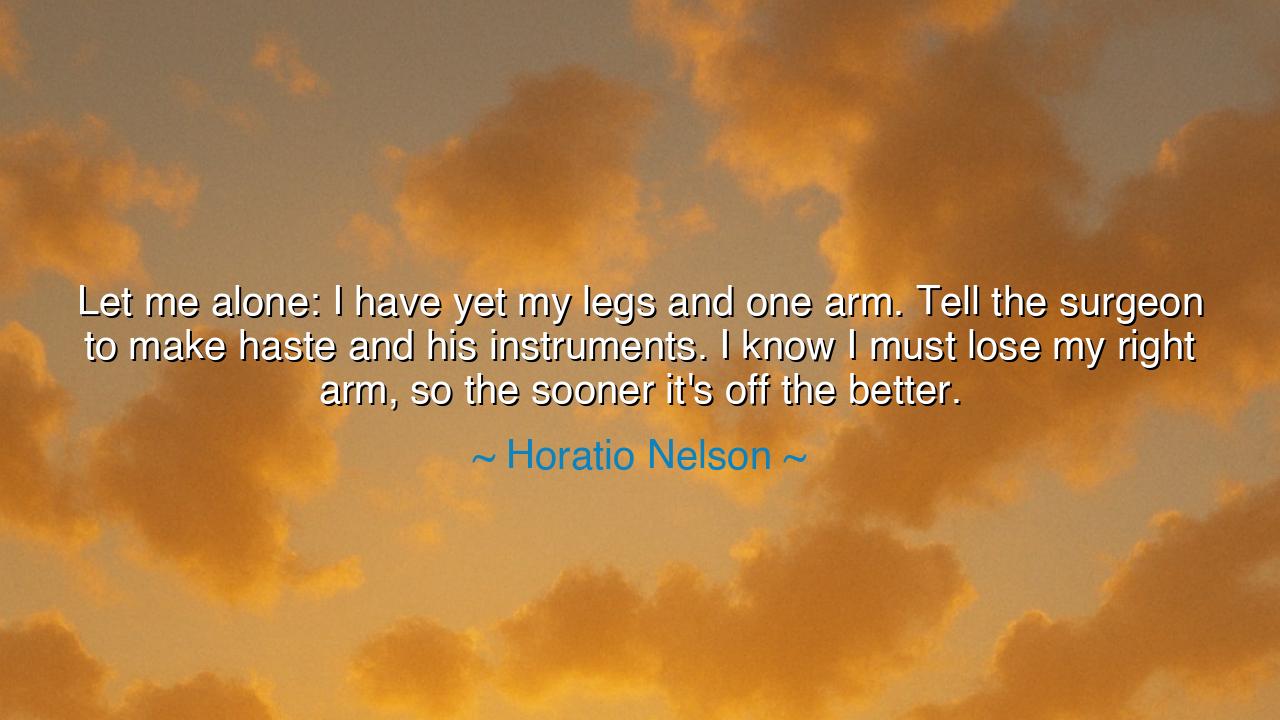
Let me alone: I have yet my legs and one arm. Tell the surgeon to
Let me alone: I have yet my legs and one arm. Tell the surgeon to make haste and his instruments. I know I must lose my right arm, so the sooner it's off the better.






"Let me alone: I have yet my legs and one arm. Tell the surgeon to make haste and his instruments. I know I must lose my right arm, so the sooner it's off the better." These words, spoken by the indomitable Horatio Nelson, reveal a mind of unflinching resolve in the face of devastating injury. Nelson, one of Britain’s most celebrated naval heroes, was gravely wounded during the Battle of Trafalgar in 1805. His declaration in the face of certain loss—an arm, his weapon, his lifeblood—demonstrates not merely physical courage, but a mental fortitude beyond measure. In his moment of greatest peril, he focused not on the horror of what was to be lost but on the urgent necessity of his continued purpose. He understood that to continue the fight, he had to sacrifice, and he did so without hesitation.
In these words, we see the very essence of stoicism, the ability to confront inevitable adversity with a spirit that refuses to be overwhelmed. Nelson’s acceptance of the loss of his arm, in the face of grave pain and certain hardship, teaches us that true strength lies in how we face the trials of life. When fate deals its cruelest blows, it is easy to surrender to despair, to mourn what is lost, to cling to the illusion of what could have been. Yet Nelson’s wisdom shines through in his response: action, not despair, is the path forward. He accepted the inevitable, focused on what he could still control, and demanded of the surgeon what was necessary to ensure his survival and future effectiveness.
Nelson's words echo a lesson taught by the ancient philosophers: to master oneself is to master the world around us. The Greek philosopher Epictetus, himself a man who suffered physical pain and loss, would have agreed with Nelson’s approach. Stoicism teaches that external circumstances—whether they be pain, suffering, or even death—are beyond our control. What we can control is our response, and it is in our responses to these challenges that our true character is revealed. Like Nelson, we must learn to accept what cannot be changed, focus on what can, and continue to move forward with purpose and resolve.
Consider the legend of the Spartan warriors, whose courage on the battlefield was legendary. When King Leonidas and his 300 men stood against the Persian Empire at Thermopylae, they knew that their sacrifice would likely be their end. Yet they fought, not out of a desire for glory or immortality, but out of duty and the knowledge that their actions would inspire future generations. In their steadfastness, they showed the same resolve Nelson displayed in the face of his own loss. The lesson here is clear: true heroism lies not in the absence of fear or suffering, but in the ability to rise above it, to accept sacrifice for the greater good, and to fulfill one’s duty regardless of the cost.
Nelson’s own life was a testament to this spirit of resilience and purpose. Though the loss of his arm would leave most in despair, Nelson saw it only as an obstacle to be removed, a necessary step to continue his mission. Even after the amputation, he returned to his duties and led his men with unmatched vigor. His courage in the face of injury and loss is not a call for reckless bravery but rather a reminder that our greatest strength often emerges from our ability to act decisively when the stakes are highest. It is in these moments that we define ourselves—not by what we have or what we’ve lost, but by what we choose to do in the face of adversity.
Nelson’s words teach us the value of accepting fate while maintaining a clear sense of purpose. In our own lives, we often face moments of trial, moments when it seems that all is lost, or that we cannot go on. But if we can channel even a fraction of Nelson’s resolve, if we can meet our challenges with the same acceptance of fate, we too will find the strength to persevere. We may not face battles on the open seas, but every day brings its own struggles, its own decisions. Whether it be overcoming personal loss, battling illness, or facing obstacles in our work, we must remember that our actions define us, not the circumstances that befall us.
So, let us learn from Nelson’s example. When faced with inevitable hardship, let us not cower or lament what is to be lost, but instead, act with purpose and resolve. Let us focus on what we can still accomplish, on the lives we can still touch, and on the duties we still have to fulfill. It is not the pain we endure that will be remembered, but the actions we take in spite of it. In doing so, we, too, will leave a legacy of immortal courage and unwavering commitment to the greater good.






AAdministratorAdministrator
Welcome, honored guests. Please leave a comment, we will respond soon